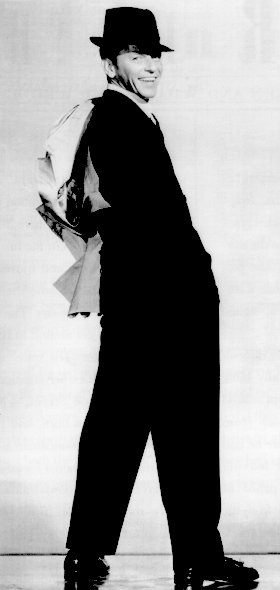
The Story of Sinatra and Hoboken and What Went Wrong By Anthony De Palma, Jr. A Myth Debunked: Everybody Booed and Threw Fruit Hoboken doesn't resent Sinatra's success, but people are bothered, and a bit ashamed, that he never came back. There had to be a reason, and when Sinatra himself never publicly admitted anything, they came up with their own. Fred Tamburro, and some other Hoboken characters who tried to hit Sinatra for favors, often get the blame. Choosing Tamby as the scapegoat somehow makes the rebuke easier to accept. "Those guys think they owned Sinatra, and they always wanted something from him," the others say. "No wonder he never came back." Other tales, loosely based on the truth, are told, but over the years they have been shaded with more legend than fact. "Oh, it was the parade they gave Sinatra," goes one of them. "Everybody booed and threw fruit. He swore he'd never come back after that." That explanation for Sinatra's thirty-year estrangement from Hoboken is so commonly offered that even some of those who attended the parade now doubt what they saw back in 1947, just a few months after Fred M. DeSapio, a Hoboken businessman, had succeeded in bucking the Hudson County political machine by upsetting Bernard McFeely in the mayoral election. DeSapio won with the help of Dolly Sinatra, who by then was as well known in Hoboken as her son. By late September, part of DeSapio's reform team had started to splinter off, forming its own coalition, and the new mayor, looking at a postwar Hoboken and the beginnings of a thirty-year ride on the skids that would ravage the city, needed a big boost. He rallied the local chamber of commerce to show off Hoboken in a March of Progress celebration that would last the entire month of October. DeSapio saved his trump card for last, squeezing every bit of advantage from the scheduled appearance on October 30 of Frank Sinatra. His faithful ward leader had not let him down. What actually transpired that day, the only official Sinatra Day Hoboken ever had, differs substantially from the legend. The day before Halloween in 1947 was wet and gloomy. Despite a heavy downpour, the crowds began gathering at City Hall in the early afternoon, and by 7 P.M., some 20,000 people lined Washington Street, waiting for the parade they were not even sure was still going to happen. Sinatra, in a trenchcoat, finally arrived at City Hall, determined to take that ride down the main drag of his hometown in a fire engine driven by his dad. Hoboken organizers were stunned by the crush of photographers and reporters who crowded into City Hall, but they somehow managed to complete a photo session and to present Sinatra with a roughly cut wooden key to the city from "the hearts of the citizens of Hoboken, New Jersey." Standing on the steps of City Hall, just around the corner from the Hudson Observer offices where he had worked as a copy boy, Sinatra blushed and told the crowd in the best, hero-returns-home fashion, "Gosh, little did I think when I worked for the Obby that I'd be greeted like this." He reached out to the crowds jumping and screaming in front of him, his fans from all over the metropolitan area mixed with his old babysitters, his stickball second baseman, his old gang. "You know," he told them, "I've met people in cities all over the country but folks here in Hoboken, well, they're just wonderful - that's all." Sinatra weaved through the crowd and jumped on the fire engine with his father. Overloaded with photographers who clung to the side of the engine, Sinatra and company made their way slowly down Washington Street. Cheers went up as they approached. Occasionally, Sinatra shouted to a recognized old buddy. "Hi, Gus. How ya doing?" By the time the parade reached Eleventh Street, the rain had become too much, and Sinatra hopped off the engine and into Mayor DeSapio's car for a retreat to City Hall. Most of the program - an awards presentation at Veterans' Field, an address at Joseph F. Brandt school - had to be canceled. It was ten o'clock, and Sinatra had to be in Madison Square Garden for a Bellevue Hospital benefit by eleven. He made his apologies and left, and the crowds still waiting at the field and school had to be told he wasn't coming. They groused a bit, but understood. Both local newspapers carried stories on the parade and reported that the crowds were exhilarated at their brief glimpse of Frankie. Even the gossipy fan magazines were there, and although they probably would have loved to report that the crowds booed and threw fruit, they mentioned only screams and excitement coming from the rainsoaked mob. The booing story that has made the rounds so frequently in Hoboken that it is now considered truth was phony. And, in fact, Sinatra returned to play Hoboken one more time. In so doing he provided the city with the basis for yet another legend about the last time he came home. |